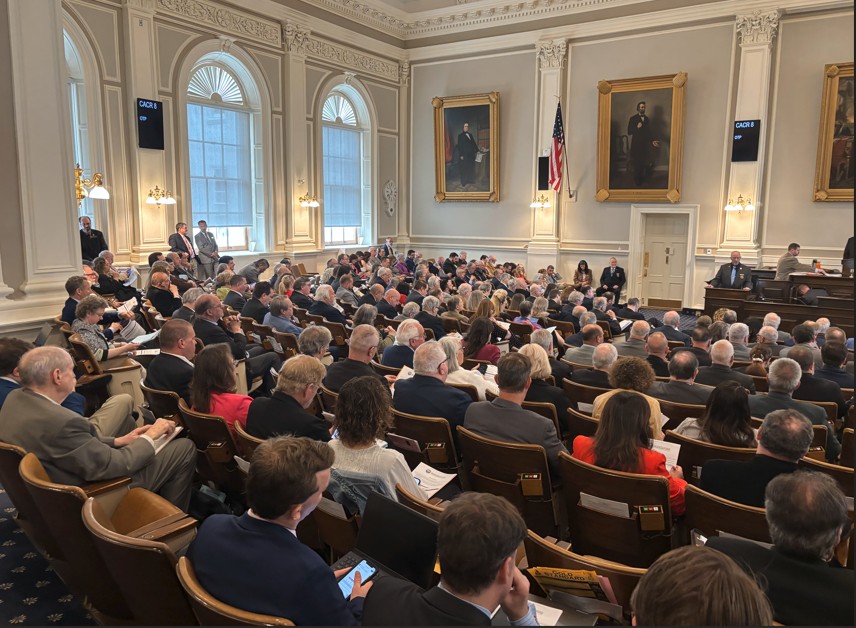By GARRY RAYNO, InDepthNH.org
CONCORD — After voting to cut off debate on the latest Education Freedom Account expansion bill, the House Republican majority approved a bill that would do away with an income cap beginning July 1.
Under the bill, there would be a 10,000 student cap on the program that has grown in four years from 1,635 students to about 5,400 students and in cost from $8 million to over $30 million.
Currently there is an income cap of 350 percent of the federal poverty level — or $112,525 for a family of four — on the program that would be eliminated next school year under Senate Bill 295, which the House passed Thursday.
House Bill 115, which is now before the Senate, would eliminate the cap beginning with the 2026-2027 school year, and would have a cap of 400 percent next school year, or $128,600 for a family of four.
Deputy Majority Leader Joe Sweeney, R-Salem, moved the previous question as the bill came to the floor which cuts off debate on the issue.
The House has debated the issue at length this session and in the past, he said.
But Rep. Laura Telerski, D-Nashua, opposed the motion saying the issue of school vouchers is extremely important to the public and voters want to hear what their representatives have to say about it, and urged her colleagues to vote against “the silencing of the debate.”
But the House voted 185-155 to cut off debate before it began.
Under the bill, if enrollment in the program reaches 90 percent of the student limit, the cap would be increased by 25 percent or to 12,500 the following school year.
The bill also sets up a priority system if the cap is reached before the expansion.
The priorities would be: 1. Student currently enrolled in the program,
2. Sibling of an enrolled student,
3. Student with disabilities, and
4. Student with family income less than 350 percent of the federal poverty guidelines.
Rep. David Luneau, D-Hopkinton, tried to amend the bill to require a performance audit currently being done by the Legislative Budget Assistant’s Office, be completed and the organization administering the program have “a clean bill of health” before there could be any expansion of the program.
He noted a sample audit several years ago found that 12 out of 50 applications were approved in error by the Children’s Scholarship Fund that administers the program.
The amendment would force the company to comply with “The laws and rules we have passed in this body and to take what we are doing seriously,” Luneau said.
But House Education Funding Chair Rep. Rick Ladd, R-Haverhill, called the amendment another trap and delaying tactic to implementing the EFA program, noting no date has been set for the audit’s release.
And he said most performance audits are 120 pages with many findings that would have to be resolved before the program could be expanded.
The amendment was defeated on a 199-165 vote.
Rep. Hope Damon, D-Croydon, urged her colleagues to defeat the bill.
“(We should not be) expanding the EFA voucher program to a cost of $100 million when we lack adequate revenues to fund essential needs of New Hampshire citizens, such as Medicaid, the state employee retirement system, affordable housing, and corrections safe staffing,” Damon said. “We should fund our impressive university system that benefits our economy rather than paying stipends to wealthy families. And most importantly the public statewide has overwhelmingly and repeatedly opposed this Free State marketing scheme.”
But Ladd said the program is not a voucher program or a voucher scam and not a recruiting tool for people moving into New Hampshire, but for parents justified in wanting alternatives if their child is struggling, or being bullied or not being challenged in a “one-size-fits-all situation.”
The bill was initially approved on a 188-176 vote and was sent to the House Finance Committee for review before coming back for a final vote.
House Bill 115 has had a public hearing before the Senate Education Committee but has yet to come before the Senate for a vote.
The House also approved Senate Bill 292 which would establish a floor under state aid for special education costs that exceed three-and-a-half times the average per pupil cost the previous year. School districts have been receiving prorated state reimbursement for those costs under what was the catastrophic aid program that have been about 50 percent of their expenditures.
The bill would require that school districts receive at least 80 percent of their special education costs that reach the catastrophic level.
The bill was referred to House Finance for review before a final vote is taken on the bill.
Garry Rayno may be reached at garry.rayno@yahoo.com.





